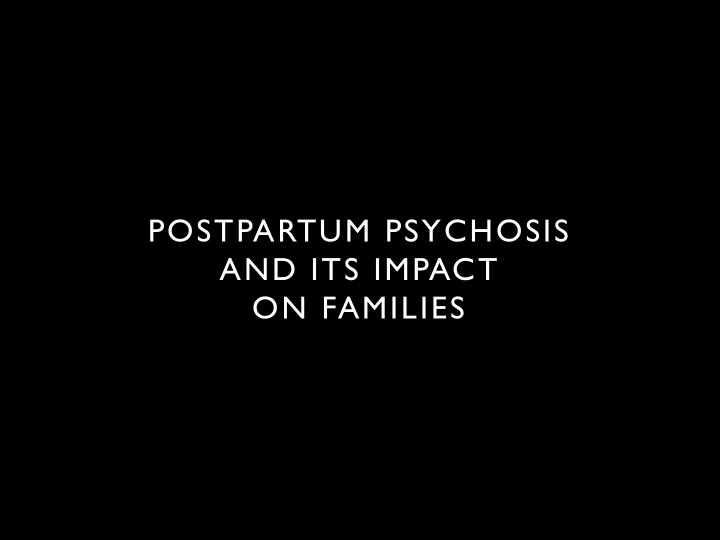

POSTPARTUM PSYCHOSIS AND ITS IMPACT ON FAMILIES
ME
DAY 4
DAY 5
DAY 6
MBU
IMPACT ON FAMILIES
AWARENESS o Raising awareness is a top priority o Not enough knowledge available – limited or out of date o Mums & families never heard of PP – not mentioned antenatally o Unaware you can develop ‘severe’ mental illness during/after childbirth o Women 33% more likely to be admitted to psychiatric services after first pregnancy/birth than at any other time – even with no previous history o Women say – “Why hadn’t we been told about this?”
IS CHILDBIRTH ASSOCIATED WITH RISK? Number of 20 admissions 18 16 14 12 10 8 6 4 2 36 34 32 30 28 26 24 22 20 18 16 14 12 10 8 6 4 2 1 2 3 4 5 6 7 8 9 10 Weeks prior to delivery Weeks following delivery Onset of major functional psychiatric disorders in the puerperium Kendell et al 1987
EARLY SYMPTOMS o Many early symptoms are missed o Difficult to differentiate between normal emotions o This table shows the top 10 early symptoms a group of 127 PP women reported before the onset of full-blown psychosis
PP FACTS o PP is the most severe form of postnatal mental illness o Affects 1 - 2 in 1000 women (1300 cases per year in UK) o Women with a history of bipolar disorder at very high risk o Onset usually within two weeks of childbirth o Partners feel isolated, overwhelmed and powerless receiving little support or information o As common as Downs syndrome this is highlighted routinely to pregnant women o Half of cases happen to women ‘out of the blue’ with no previous psychiatric history o Most likely to occur in the first 2 weekd after childbirth o Acute phase can last weeks - full recovery can take a year or more
PERINATAL SERVICES Red areas • no specialist team exists. Pink areas • Some extremely basic level of provision exists but currently falls short of national standards and needs London expanding. Amber areas • Some basic level of provision exists but currently falls short of national standards and needs expanding. Green areas • Women and families can access treatment that meets nationally agreed standards. • NHS England Perinatal mental health community services development fund (Phase 1, 2016/17) • Five Year Forward View for Mental Health – By 2020/21 there will be increased access to specialist perinatal mental health support in all areas – An additional 30,000 women each year to receive evidence-based treatment, closer to home, when they need it. – A phased, five-year transformation programme, backed by £365m in funding.
Registered charity ran by academic experts, specialist healthcare professionals, women with experience of PP. Leaflets & web resource for women, their families & health professionals. Can field requests for specialist advice to our panel of experts & offer signposting to appropriate resources / sources of support. Regional Reps, “ Experts by Experience” Campaign for improvements in perinatal mental health care. Action on PP
IMPACT ON FAMILIES - SUMMARY 1. PP is not the same as Postnatal Depression and is not a severe form of Postnatal Depression PP is as common as Down’s Syndrome yet awareness is very limited 2. 3. Everyone should have access to specialist services and inpatient units no matter where they live in the UK 4. All parents to know what Postpartum Psychosis is and what to do if it happens. 5. All front line health professionals should know the risk factors for PP, key symptoms and to be able to identify potential early symptoms. 6. All frontline health professionals should know how to talk about mental health 7. Simple compassionate care is needed for all family members. With the correct treatment women WILL recover – Tell families this! 8.
Recommend
More recommend